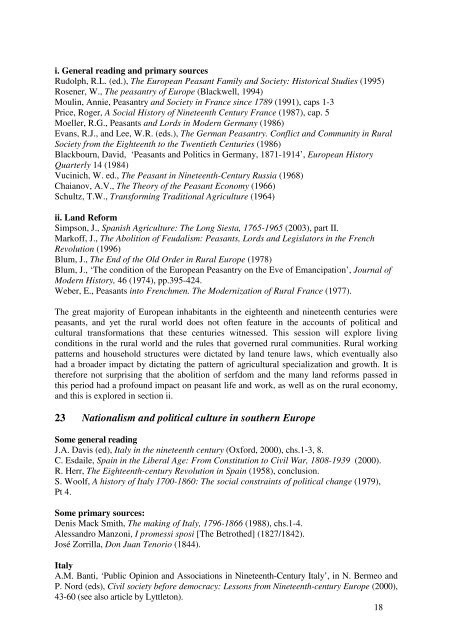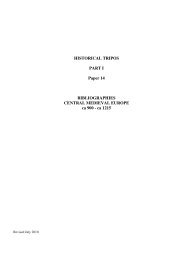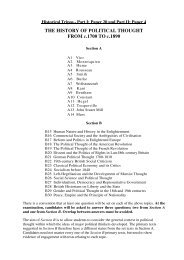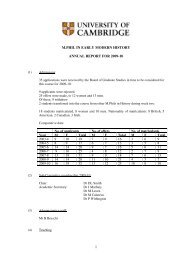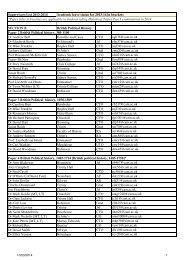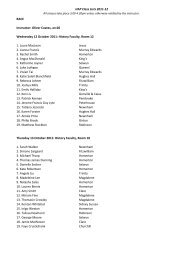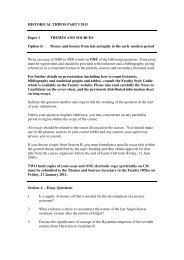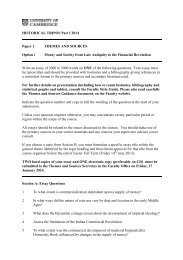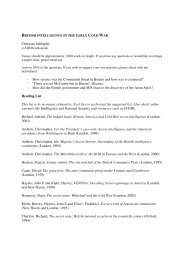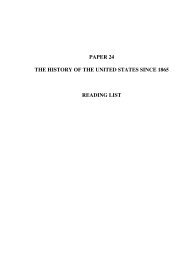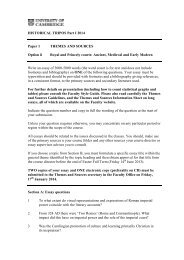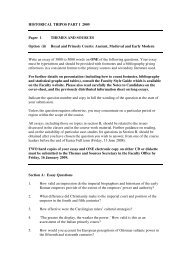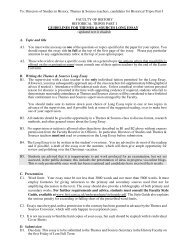Historical Tripos, Part I Paper 17 European History 1715-1890
Historical Tripos, Part I Paper 17 European History 1715-1890
Historical Tripos, Part I Paper 17 European History 1715-1890
You also want an ePaper? Increase the reach of your titles
YUMPU automatically turns print PDFs into web optimized ePapers that Google loves.
i. General reading and primary sources<br />
Rudolph, R.L. (ed.), The <strong>European</strong> Peasant Family and Society: <strong>Historical</strong> Studies (1995)<br />
Rosener, W., The peasantry of Europe (Blackwell, 1994)<br />
Moulin, Annie, Peasantry and Society in France since <strong>17</strong>89 (1991), caps 1-3<br />
Price, Roger, A Social <strong>History</strong> of Nineteenth Century France (1987), cap. 5<br />
Moeller, R.G., Peasants and Lords in Modern Germany (1986)<br />
Evans, R.J., and Lee, W.R. (eds.), The German Peasantry. Conflict and Community in Rural<br />
Society from the Eighteenth to the Twentieth Centuries (1986)<br />
Blackbourn, David, ‘Peasants and Politics in Germany, 1871-1914’, <strong>European</strong> <strong>History</strong><br />
Quarterly 14 (1984)<br />
Vucinich, W. ed., The Peasant in Nineteenth-Century Russia (1968)<br />
Chaianov, A.V., The Theory of the Peasant Economy (1966)<br />
Schultz, T.W., Transforming Traditional Agriculture (1964)<br />
ii. Land Reform<br />
Simpson, J., Spanish Agriculture: The Long Siesta, <strong>17</strong>65-1965 (2003), part II.<br />
Markoff, J., The Abolition of Feudalism: Peasants, Lords and Legislators in the French<br />
Revolution (1996)<br />
Blum, J., The End of the Old Order in Rural Europe (1978)<br />
Blum, J., ‘The condition of the <strong>European</strong> Peasantry on the Eve of Emancipation’, Journal of<br />
Modern <strong>History</strong>, 46 (1974), pp.395-424.<br />
Weber, E., Peasants into Frenchmen. The Modernization of Rural France (1977).<br />
The great majority of <strong>European</strong> inhabitants in the eighteenth and nineteenth centuries were<br />
peasants, and yet the rural world does not often feature in the accounts of political and<br />
cultural transformations that these centuries witnessed. This session will explore living<br />
conditions in the rural world and the rules that governed rural communities. Rural working<br />
patterns and household structures were dictated by land tenure laws, which eventually also<br />
had a broader impact by dictating the pattern of agricultural specialization and growth. It is<br />
therefore not surprising that the abolition of serfdom and the many land reforms passed in<br />
this period had a profound impact on peasant life and work, as well as on the rural economy,<br />
and this is explored in section ii.<br />
23 Nationalism and political culture in southern Europe<br />
Some general reading<br />
J.A. Davis (ed), Italy in the nineteenth century (Oxford, 2000), chs.1-3, 8.<br />
C. Esdaile, Spain in the Liberal Age: From Constitution to Civil War, 1808-1939 (2000).<br />
R. Herr, The Eighteenth-century Revolution in Spain (1958), conclusion.<br />
S. Woolf, A history of Italy <strong>17</strong>00-1860: The social constraints of political change (1979),<br />
Pt 4.<br />
Some primary sources:<br />
Denis Mack Smith, The making of Italy, <strong>17</strong>96-1866 (1988), chs.1-4.<br />
Alessandro Manzoni, I promessi sposi [The Betrothed] (1827/1842).<br />
José Zorrilla, Don Juan Tenorio (1844).<br />
Italy<br />
A.M. Banti, ‘Public Opinion and Associations in Nineteenth-Century Italy’, in N. Bermeo and<br />
P. Nord (eds), Civil society before democracy: Lessons from Nineteenth-century Europe (2000),<br />
43-60 (see also article by Lyttleton).<br />
18


